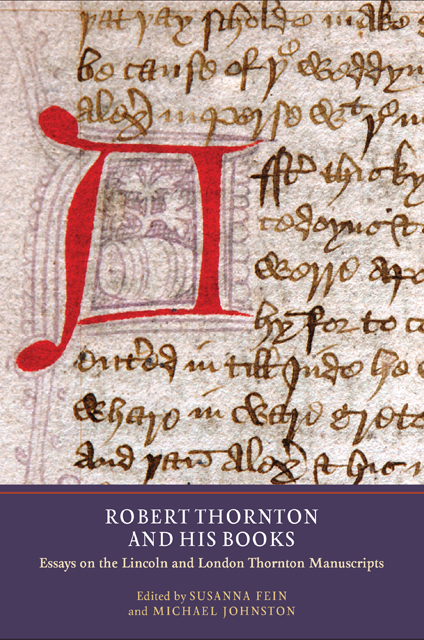Book contents
- Frontmatter
- Contents
- List of Illustrations
- List of Contributors
- Acknowledgements
- Abbreviations
- Introduction: The Cheese and the Worms and Robert Thornton
- 1 The Contents of Robert Thornton’s Manuscripts
- 2 Robert Thornton: Gentleman, Reader and Scribe
- 3 The Thornton Manuscripts and Book Production in York
- 4 The Text of the Alliterative Morte Arthure: A Prolegomenon for a Future Edition
- 5 ‘The rosselde spere to his herte rynnes’: Religious Violence in the Alliterative Morte Arthure and the Lincoln Thornton Manuscript
- 6 Constantinian Christianity in the London Thornton Manuscript: The Codicological and Linguistic Evidence of Thornton’s Intentions
- 7 Apocryphal Romance in the London Thornton Manuscript
- 8 Thornton’s Remedies and the Practices of Medical Reading
- Afterword: Robert Thornton Country
- Bibliography
- Index of Manuscripts Cited
- General Index
- York Medieval Press: Publications
1 - The Contents of Robert Thornton’s Manuscripts
Published online by Cambridge University Press: 28 February 2023
- Frontmatter
- Contents
- List of Illustrations
- List of Contributors
- Acknowledgements
- Abbreviations
- Introduction: The Cheese and the Worms and Robert Thornton
- 1 The Contents of Robert Thornton’s Manuscripts
- 2 Robert Thornton: Gentleman, Reader and Scribe
- 3 The Thornton Manuscripts and Book Production in York
- 4 The Text of the Alliterative Morte Arthure: A Prolegomenon for a Future Edition
- 5 ‘The rosselde spere to his herte rynnes’: Religious Violence in the Alliterative Morte Arthure and the Lincoln Thornton Manuscript
- 6 Constantinian Christianity in the London Thornton Manuscript: The Codicological and Linguistic Evidence of Thornton’s Intentions
- 7 Apocryphal Romance in the London Thornton Manuscript
- 8 Thornton’s Remedies and the Practices of Medical Reading
- Afterword: Robert Thornton Country
- Bibliography
- Index of Manuscripts Cited
- General Index
- York Medieval Press: Publications
Summary
In keeping with the purpose of this volume, I offer here an overview of Robert Thornton of Yorkshire’s surviving corpus and an updated list of contents. The Thornton manuscripts – hereafter called ‘Lincoln’ and ‘London’ – have been frequently described in terms of content and makeup. The treatments still considered the definitive starting-points for any new work are by Derek Brewer and A. E. B. Owen, in a 1975 facsimile of Lincoln, and by John J. Thompson, in a 1987 book that examines London. Supplementing these authorities is a plethora of descriptions over the years, dating at least from 1844 ( James Orchard Halliwell’s edition of what he termed the Thornton Romances) to 2012 (Linda Olson’s chapter in Opening Up Middle English Manuscripts). In between, many have contributed steady, gradual refinements to the growing portrait of Thornton’s substantial achievement as a self-fashioned scribe tending prayerfully and paternally to the mental nourishment and spiritual well-being of a familial household, providing them with romances and edifying entertainments, religious meditations and exempla, liturgical services, and an encyclopedia of medical remedies.
As scholarship on Thornton has advanced, much of it has centred on codicological details, with investigators using booklet and quire makeups, watermarks, palaeography, dialect of scribe versus exemplar, detectable scribal error, and styles of ornament to produce divergent answers to a host of questions: In what order did Thornton receive and copy texts? What were his methods of book construction? How fully did he follow (as he most apparently did) generic criteria for selections and arrangements? What other hands are present in the manuscript? Did the manuscripts ever leave the Thornton household during the period of their making? And what cultural assumptions, social allegiances, and literary tastes do the chosen texts reveal?
Taken collectively, the wide array of studies of Thornton’s books has sketched an ever-deepening portrait of the scribe. With few exceptions, though, individual scholars and editors are wont to examine Thornton through a specific lens of interest, examining, for example, a featured text or, alternatively, one of the dominant strands in his books: romance, religion, medicine.
- Type
- Chapter
- Information
- Robert Thornton and his BooksEssays on the Lincoln and London Thornton Manuscripts, pp. 13 - 66Publisher: Boydell & BrewerPrint publication year: 2014
- 21
- Cited by

